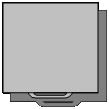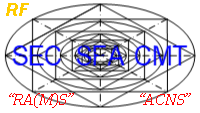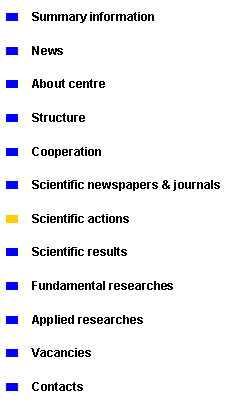|
A. The information structure of the international scientific conference
|
|
The number
of branch
by order
|
The name
of branch
|
The number
of section
by order
|
The name
of section
|
|
1.
|
“Theory
of preventive
medicine”
(“TPREVM”)
|
1.1.
|
“Theory of hygiene” (“THYG”) (*)
|
|
1.2.
|
“Theory of disinfectology” (“TDIS”) (*)
|
|
1.3.
|
“Theory of preventive epidemiology” (“TPREVEP”) (*)
|
|
1.4.
|
“Theory of recreational medicine” (“TRECRM”) (*)
|
|
1.5.
|
“Theory of sanitation” (“TSAN”) (*)
|
|
1.6.
|
“Theory of public-health-services, medical labor safety,
medical environment preservation
and medical ecology of person”
(“TPMLSMEP and MEP”) (*)
|
|
1.7.
|
“Theory of medical-social expertise,
medical-social rehabilitation
and medical sociology” (“TM-SEM-SR and MS”) (*)
|
|
2.
|
“Theory
of clinical
medicine”
(“TCLINM”)
|
2.1.
|
“Theory of obstetrics and gynecology
(of the physiological and pathological processes
in the organism of woman
after the conception, pregnancy and childbirth)”
(“TOB and GYN (PH and PPR in ORGWACPR and CH)”) (*)
|
|
2.2.
|
“Theory of anesthesiology and resuscitation
(of the methods of protecting of the organism
against the surgical trauma)”
(“TAN and RES (MPRORG ag SURGTR)”) (*)
|
|
2.3.
|
“Theory of gastro-enterology
(of the diseases of gastro-intestinal tract)”
(“TGAST-ENT (DG-IT)”) (*)
|
|
2.4.
|
“Theory of hematology and hema-transfusion
(of the transfusion of blood)”
(“THEMAT and HEMA-TR (TB)”) (*)
|
|
2.5.
|
“Theory of gerontology and geriatrics
(of the diseases of aging and rejuvenation)”
(“TGERONT and GERIATR (DAG and REJ)”) (*)
|
|
2.6.
|
“Theory of dermatology and venereology
(of the diseases of skin and venereal diseases)”
(“TDERM and VEN (DS and VEND)”) (*)
|
|
2.7.
|
“Theory of dietetics (of the diseases of improper nutrition)”
(“TDIET (DIN)”) (*)
|
|
2.8.
|
“Theory of cardiology
(of the diseases of the cardio-vascular system)”
(“TCARD (DC-VS)”) (*)
|
|
2.9.
|
“Theory of radiation diagnostics and radiation therapy”
(“TRDIANG and RTHER”) (*)
|
|
2.10
|
“Theory of neurology (of the diseases of the nervous system)”
(“TNEUR (DNERVS)”) (*)
|
|
2.11.
|
“Theory of nephrology and urology
(of the diseases of the (over)renal and sexual systems)”
(“TNEPHR and UR (D(O)REN and SEXS)”) (*)
|
|
2.12.
|
“Theory of oncology
(of the diseases of the new formations and tumors
of the biological construct of organism)”
(“TONC (DNFORM and TUMBCORG)”) (*)
|
|
2.13.
|
“Theory of laryngo-oto-rhinology or oto-rhino-laryngology
(of the diseases of the ear, throat and nose)”
(“TLAR or OTORIN (DETH and N)”) (*)
|
|
2.14.
|
“Theory of ophthalmology
(of the diseases of the visual sensory system)”
(“TOPHT (DVSS)”) (*)
|
|
2.15.
|
“Theory of pediatrics
(of the diseases of the biological construct
of organism of the children)”
(“TPED (DBCORGCH)”) (*)
|
|
2.16.
|
“Theory of psychiatry and narcology
(of the diseases of the psychical construct of the head brain)”
(“TPS and NAR (DPCHB)”) (*)
|
|
2.17.
|
“Theory of pulmonology and phthisiology
(of the diseases of the pulmonary and bronchial systems)”
(“TPULM and PHTHIS (DP and BS)”) (*)
|
|
2.18.
|
“Theory of rheumatology
(of the inflammatory and degenerative-dystrophic
diseases of the joints, spine
and the system diseases of connective tissue)”
(“TRHEUM (I and D-DDJS and SDCT)”) (*)
|
|
2.19.
|
“Theory of dentistry
(of the diseases of the cavity of mouth, jaws
and their border areas of the face and neck)”
(“TDENT (DCMJ and BAF and N)”) (*)
|
|
2.20.
|
“Theory of traumatology, orthopedics and prosthetics
(of the diseases of skeletal-muscular system)”
(“TTRORTH and PROSTH (DS-MS)”) (*)
|
|
2.21.
|
“Theory of therapy
(of the relieving or eliminating of symptoms and manifestations
of the disease or trauma)”
(“TTHER (REL or ELIMS and MD or TR)”) (*)
|
|
2.22.
|
“Theory of endocrinology
(of the diseases of the internal organs
and the disorders of hormonal cycles)”
(“TEND (DIO and DHC)”) (*)
|
|
2.23.
|
“Theory of epidemiology (of the infectious diseases)”
(“TEPID (ID)”) (*)
|
|
2.24.
|
“Theory of surgery, cardio-vascular surgery,
neuro-surgery, pediatric surgery,
transplantology and artificial organs”
(“TSURGC-VSURGN-SURGPSERGT and AO”) (*)
|
|
3.
|
“Theory
of pharmacology
and pharmaceutics”
(“TPHARMAC
and PHARMAC” )
|
3.1.
|
“Theory of pharmacology, pharmaco-epidemiology,
pharmacy, bio-chemical pharmacology,
clinical pharmacology, molecular pharmacology,
pharmaco-genomics and experimental pharmacology”
(“TPHPH-EPPHB-CHPHCLPHMPHPH-G and EXPPH”) (*)
|
|
4.
|
“Theory
of sports
medicine”
(“TSPM”)
|
4.1.
|
“Theory of medicine of competitions, sports
and sports sciences” (“TMCSP and SPS”)
|
|
5.
|
“Theory
of military
medicine”
(“TMILM”)
|
5.1.
|
“Theory of medicine and medical education
in the armed forces” (“TM and NEDUC in MF”)
|
|
6.
|
“Theory of chemistry
and chemical
technologies
in the medicine”
(“TCHEM
and CHEMT in M”)
|
6.1.
|
“Theory of chemistry, chemical technology
and chemical industry in the medicine”
(“TCHEMCHEMT and CHEMIND in M”)
|
|
7.
|
“Theory of biology,
physiology
and bio-
physiological
technologies
in the medicine”
(“TBIOLPHYS
and B-PHYST
in M”)
|
7.1.
|
“Theory of general biology” (“TGENB”)
|
|
7.2.
|
“Theory of physical-chemical
bio-technology”
(“TPHYS-CHEMB-T”) (*)
|
|
7.3.
|
“Theory of physiology, bio-physiology
and private physiology
(of sensory systems)”
(“TPHYSB-PHYS and PRPHYS (SS)”) (*)
|
|
8.
|
“Theory
of mathematics
and mathematical
technologies
in the medicine”
(“TMATH
and MATHT in M”)
|
8.1
|
“Theory of medical mathematics
and the complex system analysis
based on the cognitive modeling technology”
(“TMMATH and DSAB on CMT”) (*)
|
|
8.2
|
“Theory of medical cybernetics
and (cognitive) informatics”
(“TMCYB and (CONG)INF”) (*)
|
|
9.
|
“Theory
of nano-technologies
and information
technologies
in the medicine”
(“TNANO-T
and INFT in M”)
|
9.1.
|
“Theory of medical electronics, radio-technics and connection”
(“TMELR-T and CONN”)
|
|
9.2.
|
“Theory of medical automatics, computing technics
and the system analysis
based on the cognitive modeling technology”
(“TMAUTCT and SAB on CMT”) (*)
|
|
9.3.
|
“Theory of the nano-technologies
for the mechanical-engineering, instrument-making,
polygraphy, reprography and photo-cinema-technics,
the light and food industry,
transport, architecture and construction in the medicine”
(“TNANO-T for M-EI-MPRPH-S-TL and FITA and C in M”) (*)
|
|
10.
|
“Theory
of social-science
and technologies
of social sciences
in the medicine”
(“TSOC-ST
and TSOCS in M”)
|
10.1.
|
“Theory of social sciences, philosophy, science-study,
politics and political sciences,
sociology, (cognitive) psychology,
state, law and jurisprudential sciences, patent business,
invention and rationalization in the medicine”
(“TSOCSPHS-STP and PSS(C)PSL and JSPBI and R in M”) (*)
|
|
10.2.
|
“Theory of the economics and economic sciences,
organization, management, statistics
and the financial analysis based on
the cognitive modeling technology in the medicine”
(“TECON and ECONSOMS and FAB on CMT in M”) (*)
|
|
B. The materials of the international scientific conference
|
|
The year
of holding
|
The name
of sciences
|
The number
of submitted
scientific
reports
|
The name of language
and the universal locator
of information resource
|
|
2015 y.
|
Fundamental
|
-
|
The intern. foreign English language (go to),
the national Russian language (go to)
|
|
2016 y.
|
Fundamental
|
-
|
The intern. foreign English language (go to),
the national Russian language (go to)
|
|
2017 y.
|
Fundamental
|
-
|
The intern. foreign English language (go to),
the national Russian language (go to)
|
|
2018 y.
|
Fundamental
|
-
|
The intern. foreign English language (go to),
the national Russian language (go to)
|
|
A. The information structure of the international scientific conference
|
|
The number
of direction
by order
|
The name
of direction
|
The number
of section
by order
|
The name
of section
|
|
1.
|
“Applications
of preventive
medicine”
(“APPREVM”)
|
1.1.
|
“Applications of hygiene” (“PHYG”) (*)
|
|
1.2.
|
“Applications of disinfectology” (“APDIS”) (*)
|
|
1.3.
|
“Applications of preventive epidemiology”
(“APPREVEP”) (*)
|
|
1.4.
|
“Applications of recreational medicine” (“APRECRM”) (*)
|
|
1.5.
|
“Applications of sanitation” (“APSAN”) (*)
|
|
1.6.
|
“Applications of public-health-services, medical labor safety,
medical environment preservation
and medical ecology of person”
(“APPMLSMEP and MEP”) (*)
|
|
1.7.
|
“Applications of medical-social expertise,
medical-social rehabilitation
and medical sociology” (“APM-SEM-SR and MS”) (*)
|
|
2.
|
“Applications
of clinical
medicine”
(“APCLINM”)
|
2.1.
|
“Applications of obstetrics and gynecology
(of the physiological and pathological processes
in the organism of woman
after the conception, pregnancy and childbirth)”
(“APOB and GYN (PH and PPR in ORGWACPR and CH)”) (*)
|
|
2.2.
|
“Applications of anesthesiology and resuscitation
(of the methods of protecting of the organism
against the surgical trauma)”
(“APAN and RES (MPRORG ag SURGTR)”) (*)
|
|
2.3.
|
“Applications of gastro-enterology
(of the diseases of gastro-intestinal tract)”
(“APGAST-ENT (DG-IT)”) (*)
|
|
2.4.
|
“Applications of hematology and hema-transfusion
(of the transfusion of blood)”
(“APHEMAT and HEMA-TR (TB)”) (*)
|
|
2.5.
|
“Applications of gerontology and geriatrics
(of the diseases of aging and rejuvenation)”
(“APGERONT and GERIATR (DAG and REJ)”) (*)
|
|
2.6.
|
“Applications of dermatology and venereology
(of the diseases of skin and venereal diseases)”
(“APDERM and VEN (DS and VEND)”) (*)
|
|
2.7.
|
“Applications of dietetics
(of the diseases of improper nutrition)”
(“APDIET (DIN)”) (*)
|
|
2.8.
|
“Applications of cardiology
(of the diseases of the cardio-vascular system)”
(“APCARD (DC-VS)”) (*)
|
|
2.9.
|
“Applications of radiation diagnostics and radiation therapy”
(“APRDIANG and RTHER”) (*)
|
|
2.10.
|
“Applications of neurology
(of the diseases of the nervous system)”
(“APNEUR (DNERVS)”) (*)
|
|
2.11.
|
“Applications of nephrology and urology
(of the diseases of the (over)renal and sexual systems)”
(“APNEPHR and UR (D(O)REN and SEXS)”) (*)
|
|
2.12.
|
“Applications of oncology
(of the diseases of the new formations and tumors
of the biological construct of organism)”
(“APONC (DNFORM and TUMBCORG)”) (*)
|
|
2.13.
|
“Applications of laryngo-oto-rhinology
or oto-rhino-laryngology
(of the diseases of the ear, throat and nose)”
(“APLAR or OTORIN (DETH and N)”) (*)
|
|
2.14.
|
“Applications of ophthalmology
(of the diseases of the visual sensory system)”
(“APOPHT (DVSS)”) (*)
|
|
2.15.
|
“Applications of pediatrics
(of the diseases of the biological construct
of organism of the children)”
(“APPED (DBCORGCH)”) (*)
|
|
2.16.
|
“Applications of psychiatry and narcology
(of the diseases of the psychical construct of the head brain)”
(“APPS and NAR (DPCHB)”) (*)
|
|
2.17.
|
“Applications of pulmonology and phthisiology
(of the diseases of the pulmonary and bronchial systems)”
(“APPULM and PHTHIS (DP and BS)”) (*)
|
|
2.18.
|
“Applications of rheumatology
(of the inflammatory and degenerative-dystrophic
diseases of the joints, spine
and the system diseases of connective tissue)”
(“APRHEUM (I and D-DDJS and SDCT)”) (*)
|
|
2.19.
|
“Applications of dentistry
(of the diseases of the cavity of mouth, jaws
and their border areas of the face and neck)”
(“APDENT (DCMJ and BAF and N)”) (*)
|
|
2.20.
|
“Applications of traumatology, orthopedics and prosthetics
(of the diseases of skeletal-muscular system)”
(“APTRORTH and PROSTH (DS-MS)”) (*)
|
|
2.21.
|
“Applications of therapy
(of the relieving or eliminating of symptoms and manifestations
of the disease or trauma)”
(“APTHER (REL or ELIMS and MD or TR)”) (*)
|
|
2.22.
|
“Applications of endocrinology
(of the diseases of the internal organs
and the disorders of hormonal cycles)”
(“APEND (DIO and DHC)”) (*)
|
|
2.23.
|
“Applications of epidemiology (of the infectious diseases)”
(“APEPID (ID)”) (*)
|
|
2.24.
|
“Applications of surgery, cardio-vascular surgery,
neuro-surgery, pediatric surgery,
transplantology and artificial organs”
(“APSURGC-VSURGN-SURGPSERGT and AO”) (*)
|
|
3.
|
“Applications
of pharmacology
and pharmaceutics”
(“APPHARMAC
and PHARMAC”)
|
3.1.
|
“Applications of pharmacology,
pharmaco-epidemiology, pharmacy,
bio-chemical pharmacology, clinical pharmacology,
molecular pharmacology, pharmaco-genomics
and experimental pharmacology”
(“APPHPH-EPPHB-CHPHCLPHMPHPH-G and EXPPH”) (*)
|
|
4.
|
“Applications
of sports
medicine”
(“APSPM”)
|
4.1.
|
“Applications of medicine of competitions,
sports and sports sciences” (“APMCSP and SPS”)
|
|
5.
|
“Applications
of military
medicine”
(“APMILM”)
|
5.1.
|
“Applications of medicine and medical education
in the armed forces” (“APM and NEDUC in AF”)
|
|
6.
|
“Applications
of chemistry
and chemical
technologies
in the medicine”
(“APCHEM
and CHEMT in M”)
|
6.1.
|
“Applications of chemistry, chemical technology
and chemical industry in the medicine”
(“APCHEMCHEMT and CHEMIND in M”)
|
|
7.
|
“Applications
of biology, physiology
and bio-
physiological
technologies
in the medicine”
(“APBIOLPHYS
and B-PHYST
in M”)
|
7.1.
|
“Applications of general biology” (“APGENB”)
|
|
7.2.
|
“Applications of physical-chemical bio-technology”
(“APPHYS-CHEMB-T”) (*)
|
|
7.3.
|
“Applications of physiology, bio-physiology
and private physiology (of sensory systems)”
(“APPHYSB-PHYS and PRPHYS (SS)”) (*)
|
|
8.
|
“Applications
of mathematics
and mathematical
technologies
in the medicine”
(“APMATH
and MATHT in M”)
|
8.1.
|
“Applications of medical mathematics
and the complex system analysis
based on the cognitive modeling technology”
(“APMMATH and DSAB on CMT”) (*)
|
|
8.2.
|
“Applications of medical cybernetics
and (cognitive) informatics”
(“APMCYB and (CONG)INF”) (*)
|
|
9.
|
“Applications
of nano-technologies
and information
technologies
in the medicine”
(“APNANO-T
and INFT in M”)
|
9.1.
|
“Applications of medical electronics,
radio-technics and connection” (“APMELR-T and CONN”)
|
|
9.2.
|
“Applications of medical automatics,
computing technics and the system analysis
based on the cognitive modeling technology”
(“APMAUTCT and SAB on CMT”) (*)
|
|
9.3.
|
“Applications of nano-technologies
for the mechanical-engineering, instrument-making,
polygraphy, reprography and photo-cinema-technics,
the light and food industry,
transport, architecture and construction in the medicine”
(“APNANO-T for M-EI-MPRPH-S-TL and FITA and C in M”) (*)
|
|
10.
|
“Applications
of social-science
and technologies
of social sciences
in the medicine”
(“APSOC-ST
and TSOCS in M”)
|
10.1.
|
“Applications of social sciences,
philosophy, science-study, politics and political sciences,
sociology, (cognitive) psychology,
state, law and jurisprudential sciences, patent business,
invention and rationalization in the medicine”
(“APSOCSPHS-STP and PSS(C)PSL and JSPBI and R in M”) (*)
|
|
10.2.
|
“Applications of the economics and economic sciences,
organization, management,
statistics and the financial analysis based on
the cognitive modeling technology in the medicine”
(“APECON and ECONSOMS and FAB on CMT in M”) (*)
|
|
B. The materials of the international scientific conference
|
|
The year
of holding
|
The name
of sciences
|
The number
of submitted
scientific
reports
|
The name of language
and the universal locator
of information resource
|
|
2015 y.
|
Applied
|
-
|
The intern. foreign English language (go to),
the national Russian language (go to)
|
|
2016 y.
|
Applied
|
-
|
The intern. foreign English language (go to),
the national Russian language (go to)
|
|
2017 y.
|
Applied
|
-
|
The intern. foreign English language (go to),
the national Russian language (go to)
|
|
2018 y.
|
Applied
|
-
|
The intern. foreign English language (go to),
the national Russian language (go to)
|




